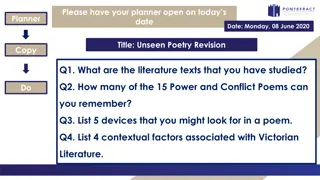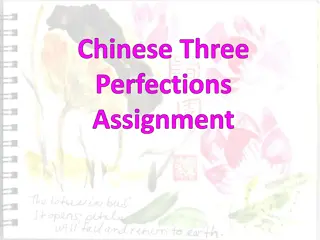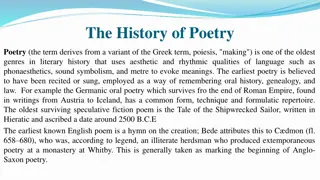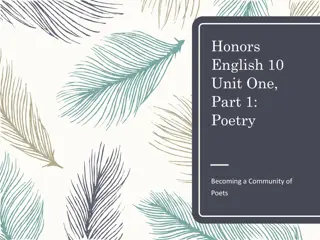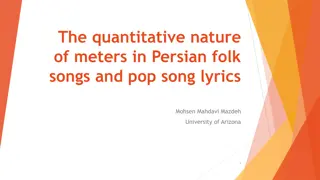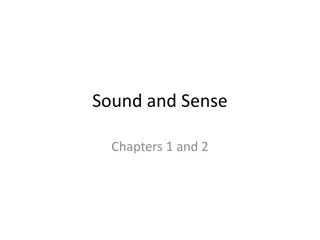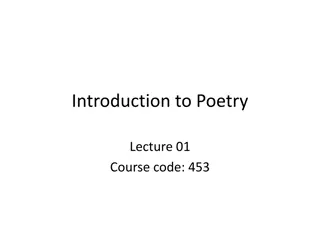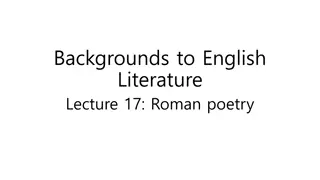Exploring AAPI Women's Untold Stories Through Poetry
Delve into the world of AAPI women's voices through poetry, uncovering untold stories and capturing emotions with the power of words. Learn about prominent figures like Janice Mirikitani and their contributions to literature, shedding light on historical injustices and personal experiences. Engage in discussions on the essence of poetry, its structure, and the diverse perspectives it offers in the Asian American and Pacific Islander community. Through this unit, discover how poetry serves as a medium for self-expression, activism, and empowerment.
Download Presentation

Please find below an Image/Link to download the presentation.
The content on the website is provided AS IS for your information and personal use only. It may not be sold, licensed, or shared on other websites without obtaining consent from the author. Download presentation by click this link. If you encounter any issues during the download, it is possible that the publisher has removed the file from their server.
E N D
Presentation Transcript
AAPI AAPI Women Voices: Women Voices: Untold Stories Untold Stories Through Poetry Through Poetry Unit Slide Unit Slide AsianAmericanEdu.org 1 AASC.UCLA.edu AsianAmericanEdu.org1AASC.UCLA.edu
AAPI Women Voices: Untold Stories T AAPI Women Voices: Untold Stories Through Poetry hrough Poetry LES LESSON 1 SON 1 Unit Introduction Unit Introduction Central Idea Central Idea AsianAmericanEdu.org 2 AASC.UCLA.edu AsianAmericanEdu.org2AASC.UCLA.edu
What Is Poetry Anticipation Guide What Is Poetry Anticipation Guide Please fill out the What Is Poetry Anticipation Guide in your handout. Let s Review when everyone has completed the form. AsianAmericanEdu.org 3 AASC.UCLA.edu AsianAmericanEdu.org3AASC.UCLA.edu
What Is Poetry Anticipation Guide What Is Poetry Anticipation Guide Agree or Disagree Poetry is something I m familiar with Poetry is fun. Poetry is hard to understand. Poetry is difficult to write. Poetry is written by women Poetry is written by Asian Americans and Pacific Islander Americans. AsianAmericanEdu.org 5 AASC.UCLA.edu AsianAmericanEdu.org5AASC.UCLA.edu
Basic Structure of a Poem Basic Structure of a Poem Prose Structure: Poetry Structure: Sentence Line Paragraph Stanza AsianAmericanEdu.org 6 AASC.UCLA.edu AsianAmericanEdu.org6AASC.UCLA.edu
AAPI Women Voices: Untold Stories AAPI Women Voices: Untold Stories Through Poetry Through Poetry AAPI is short for Asian American and Pacific Islander. We will explore how poems are used to depict various subjects. Poets often explore different issues, topics, and ways of thinking. AsianAmericanEdu.org 7 AASC.UCLA.edu AsianAmericanEdu.org 7 AASC.UCLA.edu
Janice Janice Mirikitani Mirikitani Born, raised in California She is a community organizer She and her family were incarcerated in Rohwer, Arkansas, concentration camp with the mass internment of 120,000 Japanese Americans during World War II. AsianAmericanEdu.org 7 AASC.UCLA.edu AsianAmericanEdu.org7AASC.UCLA.edu
Janice Janice Mirikitani Mirikitani Co-founder and President of the Glide Foundation. Glide empowers San Francisco s poor and marginalized communities to make meaningful changes in their lives to break the cycle of poverty and dependence. AsianAmericanEdu.org 8 AASC.UCLA.edu AsianAmericanEdu.org8AASC.UCLA.edu
Bad Women by Janice Bad Women by Janice Mirikitani Central Idea of a poem Let us watch the video Bad Women, a poem by Janice Mirikitani Mirikitani Observe in the Bad Women video: How Mirikitani emphasizes her words How she introduces her topic How she concludes her poem Now watch the video AsianAmericanEdu.org 9 AASC.UCLA.edu AsianAmericanEdu.org9AASC.UCLA.edu
Reflection on Bad Women Reflection on Bad Women Do you agree with Janice s take on being a bad woman? Do you enjoy her poem? What pieces do you like or dislike? Where does her inspiration come from? Poets often surprise us about topics Write what others would be surprised to learn about you. AsianAmericanEdu.org 10 AASC.UCLA.edu AsianAmericanEdu.org10AASC.UCLA.edu
Expectation of this Class Expectation of this Class We will exploring 1 or 2 poems each day in class Study poems as homework Learn how to write poems At the end of this unit you will write your own poem Keep all your classwork , homework, & handouts. They will be helpful in writing your own poem. Bring handouts. AAPI Women Voices: Untold Stories Through Poetry story contains all the poems for lecture, classwork and homework. Bring it to class everyday. AsianAmericanEdu.org 11 AASC.UCLA.edu AsianAmericanEdu.org11AASC.UCLA.edu
Classwork Classwork Highlight their favorite lines. Star lines that make you think differently about the title Bad Women. Think about the last line, the concluding line, Bad women can burn. What does it mean? Is that the central idea of the poem? Mark the lines which support the concluding line. AsianAmericanEdu.org 12 AASC.UCLA.edu AsianAmericanEdu.org12AASC.UCLA.edu
Class Discussion Class Discussion What is the central idea of the poem? What is Janice Mirikitani conveying in her concluding line? Keep in mind you will need a central idea and a concluding line for your own poem. AsianAmericanEdu.org 13 AASC.UCLA.edu AsianAmericanEdu.org13AASC.UCLA.edu
Homework Homework 1. Read Janice Mirikitani s biography in the AAPI Women Voice story 2. Read Shirley Geok-Lin Lim s biography 3. Read Learning to love America by Shirley Geok-Lin Lim 4. How does Shirley Geok-Lin Lim support her central idea? Write your interpretation of the 7 lines in the poem. Write how you feel about the concluding line. AsianAmericanEdu.org 14 AASC.UCLA.edu AsianAmericanEdu.org14AASC.UCLA.edu
Homework 2 Homework 2 1. Read Lehua M. Taitano s biography 2. Read One Kind of Hunger by Lehua Taitano 3. Turn to Homework 2 in your Central Idea Handout Background information about the poem: The poem is Lehua Taitano s response/ re- telling of The Origin of Stories. The Origin of Stories is a Seneca oral story regarding the creation of story itself and its importance in passing on cultural tradition. AsianAmericanEdu.org 1 AASC.UCLA.edu AsianAmericanEdu.org1AASC.UCLA.edu
Homework 2 Homework 2 One Kind of Hunger is a furthering of the ideology of indigenous cultural preservation practices. It tells the tale of an orphan boy who goes out hunting and discovers a stone that tells stories. The boy learns quickly that the emotional nourishment he receives from the stone s stories is even more important than the physical nourishment he receives from the birds he hunts. 4. Find at least 3 lines in the poem that support the central idea of the poem. 5. Write how the central idea relates to your own experiences. AsianAmericanEdu.org 16 AASC.UCLA.edu AsianAmericanEdu.org16 AASC.UCLA.edu
AAPI Women Voices: Untold Stories AAPI Women Voices: Untold Stories Through Poetry Through Poetry Curriculum Developer: Pat Kwoh, Megan Roberto Curriculum Contributors: Prabhneek Heer, Kristy Phan AsianAmericanEdu.org 17 AASC.UCLA.edu AsianAmericanEdu.org17AASC.UCLA.edu
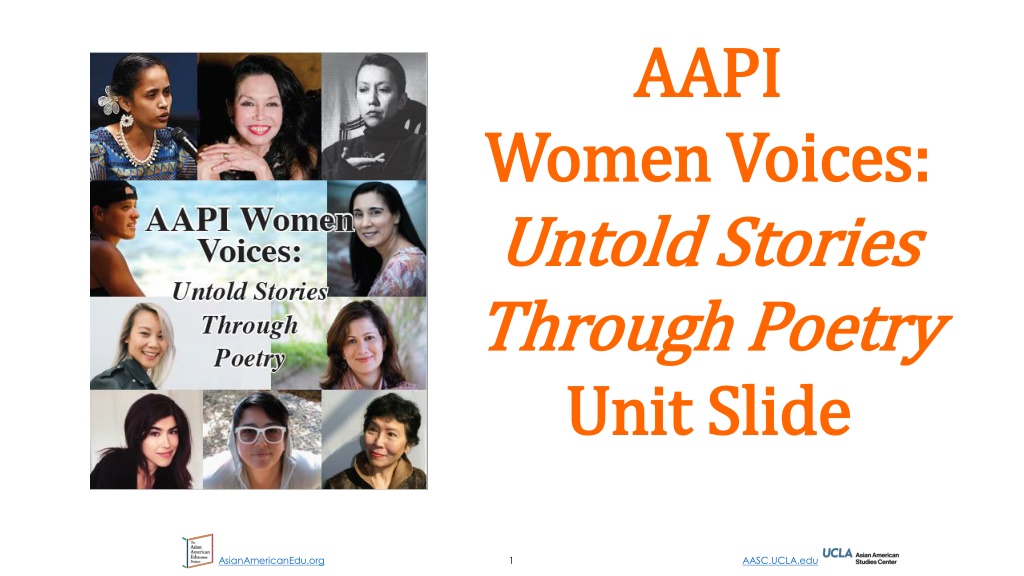

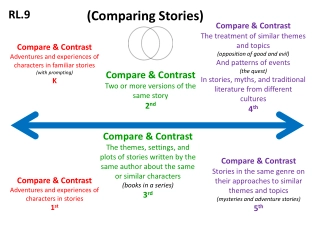
![Read⚡ebook✔[PDF] The Untold Stories of the Space Shuttle Program: Unfulfilled D](/thumb/21685/read-ebook-pdf-the-untold-stories-of-the-space-shuttle-program-unfulfilled-d.jpg)


